
Theoretical and Applied Ecology
metrics 2024
Bridging Theory and Application in Ecology
Introduction
Theoretical and Applied Ecology, an esteemed journal published by LLC PUBLISHING HOUSE, KAMERTON, is dedicated to advancing knowledge in the rigorous fields of ecology and applied ecological research. With the ISSN 1995-4301 and E-ISSN 2618-8406, this journal has established a firm foothold since its inception in 2017, converging impressive research and findings from the Russian Federation and beyond. Although currently lacking an impact factor and H-index, its Q3 ranking in Ecology and Ecology, Evolution, Behavior and Systematics exemplifies its growing influence in the academic community. Furthermore, its rankings in Scopus highlight its relevance within the environmental sciences and agricultural sectors. Committed to providing open access to scholarly articles and fostering a collaborative approach to ecological research, Theoretical and Applied Ecology serves as a vital resource for researchers, professionals, and students eager to explore innovative ecological theories and applications that shape understanding and practices in ecology today.
Metrics 2024
 0.26
0.26 0.50
0.50 0.50
0.50 9
9Metrics History
Rank 2024
Scopus
IF (Web Of Science)
JCI (Web Of Science)
Quartile History
Similar Journals
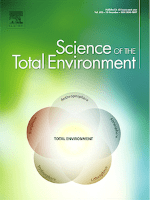
Science of The Total Environment
Driving Change Through Comprehensive Environmental ResearchScience of The Total Environment, an esteemed journal published by Elsevier, holds a significant position in the field of environmental science, encompassing critical areas such as Environmental Chemistry, Environmental Engineering, Pollution, and Waste Management and Disposal. With an impressive impact factor and ranked in the Q1 quartile across its categories for 2023, the journal is recognized for its high-quality research output and contribution to environmental sustainability. Operating from its base in the Netherlands, the journal has been a valuable resource since its inception in 1972, welcoming innovative studies that address complex environmental challenges. Its notable rankings—such as Rank #9 in both Environmental Sciences and Pollution—underscore its relevance and influence in the academic community. Although the journal currently does not provide an open access option, the robust findings and discussions presented within its pages continue to foster a deeper understanding of environmental issues. Science of The Total Environment is an essential platform for researchers, professionals, and students dedicated to advancing knowledge and solutions in the rapidly evolving field of environmental science.

TROPICAL ECOLOGY
Advancing Knowledge in Tropical EcologyTropical Ecology is a distinguished journal published by SpringerNature that has been at the forefront of advancing the field of ecology since its inception. With a focus on tropical ecosystems, it addresses critical areas such as conservation biology, systematics, and environmental science. The journal is indexed within leading databases and enjoys a respectable impact factor, ranking in the second quartile (Q2) in Ecology as well as in Plant Science, and third quartile (Q3) in Ecology, Evolution, Behavior and Systematics for 2023. Its insightful research contributions place it among the top-tier publications in Agricultural and Biological Sciences, specifically in rankings such as #185 in Plant Science and #178 in Ecology. While it currently operates under subscription access, it remains an essential resource for researchers, professionals, and students interested in the dynamics of tropical environments, fostering a greater understanding of ecological principles and practices that are pivotal for sustainable development. The journal operates with continuous publication from 1976 to 2024, ensuring timely dissemination of impactful research findings that contribute to the global body of knowledge.

BIODIVERSITY AND CONSERVATION
Advancing knowledge for a sustainable future.Biodiversity and Conservation is a leading peer-reviewed journal published by Springer, dedicated to advancing the understanding of biodiversity and the critical aspects of conservation biology. With an impact factor that consistently places it in the Q1 category across multiple fields including Ecology, Evolution, and Nature and Landscape Conservation, this journal serves as a vital resource for researchers, professionals, and students who aim to address the pressing challenges of biodiversity loss and ecosystem management. Established in 1992, the journal has successfully created a platform for high-quality research and innovative approaches, facilitating the dissemination of knowledge that informs conservation practices globally. With a strong ranking in Scopus, it highlights the importance of rigorous scientific inquiry in the preservation of our natural world. Subscribers can access a wealth of articles that encompass a broad range of topics pertinent to both theoretical and practical aspects of biodiversity, encouraging an interdisciplinary dialogue among the diverse fields of environmental science and conservation.
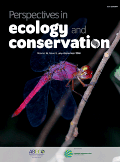
Perspectives in Ecology and Conservation
Innovative insights into conservation challenges and solutions.Perspectives in Ecology and Conservation, published by Elsevier Science Ltd, is a leading academic journal dedicated to advancing the fields of ecology, conservation, and environmental management. With a Q1 ranking in multiple categories, including Ecology, Management, Monitoring, Policy and Law, and Nature and Landscape Conservation, this journal boasts an impressive standing among its peers, making it essential reading for researchers and professionals. Since its inception in 2017 and running through 2024, it aims to provide innovative perspectives and critical analyses that enhance our understanding and practices in conservation science. The journal is accessible through open access options, facilitating broader dissemination of knowledge. Its commitment to addressing contemporary ecological challenges reinforces its importance in the academic community, promoting sustainable practices and informed policy-making in the face of urgent environmental issues.
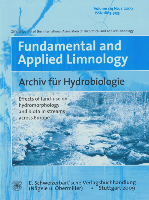
Fundamental and Applied Limnology
Innovating in Limnology: Where Research Meets Real-World ImpactFundamental and Applied Limnology is an esteemed academic journal dedicated to the exploration of freshwater ecosystems, bridging the gap between fundamental research and practical applications. Published by E Schweizerbart'sche Verlagsbuchhandlung in Germany, this journal has been a vital resource in the fields of aquatic science and ecology since its inception in 2007. With its ISSN 1863-9135 and E-ISSN 1863-9135, it provides a platform for researchers to disseminate significant findings related to limnology, contributing to a rich understanding of freshwater biodiversity, water quality, and ecological interactions. Although currently rated in the Q3 quartile for aquatic sciences and ecology as per the 2023 rankings, it remains a valuable outlet for interdisciplinary research and practical insights, facilitating critical advancements in environmental management. Open access options enhance its visibility and accessibility, making it indispensable for researchers, professionals, and students alike who are committed to advancing the scholarship in freshwater studies. Engaging with this journal not only opens doors to the latest research findings but also fosters collaboration and innovation in the ecological community.
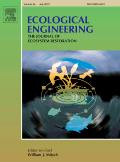
ECOLOGICAL ENGINEERING
Connecting research and practice for a sustainable world.ECOLOGICAL ENGINEERING, published by Elsevier in the Netherlands, is a leading journal dedicated to advancing the field of environmental engineering and sustainable development. With an impressive impact factor and recognized as Q1 in multiple categories including Environmental Engineering, Management, Monitoring, Policy and Law, as well as Nature and Landscape Conservation, this journal stands at the forefront of environmental science research. It ranks among the top publications in its fields according to Scopus, reinforcing its significance with a notable position within the 90th percentile for Nature and Landscape Conservation. ECOLOGICAL ENGINEERING encourages open discourse and dissemination of innovative practices aimed at addressing contemporary ecological challenges, making it an essential resource for researchers, professionals, and students committed to sustainable practices and environmental stewardship. The journal’s comprehensive scope includes ecological restoration, habitat management, and policy implementation, ensuring a broad spectrum of relevant topics for its readership.
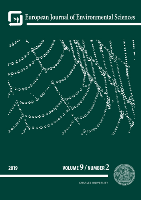
European Journal of Environmental Sciences
Bridging Science and Policy for a Greener EuropeEuropean Journal of Environmental Sciences is a prominent open-access journal dedicated to disseminating high-quality research in the field of environmental science. Published by Charles University, Faculty of Mathematics & Physics, this journal has been a vital platform since 2011, facilitating free access to insightful studies and findings pertinent to pressing environmental issues. Its scope encompasses crucial topics in Ecology, Management, Monitoring, Policy, Law, Nature and Landscape Conservation, and Pollution. With a significant presence in the academic community, the journal currently holds a Q3 and Q4 category ranking in various subfields of environmental science, as assessed in 2023, showcasing its relevance and impact in the discipline. Researchers, professionals, and students engaging with the European Journal of Environmental Sciences will find it an essential resource for enhancing their understanding of environmental challenges and contributing to innovative solutions.

WETLANDS ECOLOGY AND MANAGEMENT
Elevating the discourse on ecological management and preservation.Wetlands Ecology and Management, published by Springer, is an esteemed journal that has been advancing the field of wetland studies since its inception in 1982. Operating under the ISSN 0923-4861 and E-ISSN 1572-9834, this journal is headquartered in the Netherlands and serves as a critical resource for researchers, professionals, and students alike. It fosters interdisciplinary dialogue among aquatic science, ecology, and resource management disciplines, ranking in the Q2 category for Aquatic Science and Ecology, Evolution, Behavior and Systematics as of 2023. With a notable Scopus ranking, it is positioned favorably within the 65th percentile in Ecology and a commendable 58th percentile in Aquatic Sciences. The journal emphasizes the importance of effective management strategies and policies in the conservation of wetlands, making it indispensable for those aiming to drive impactful research. Although it is not an open-access journal, its high-quality publications remain accessible through library consortia and institutional subscriptions, ensuring that pertinent insights into the ecological dynamics and sustainable management practices are available to the global research community.
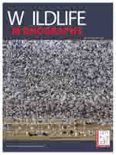
WILDLIFE MONOGRAPHS
Elevating the discourse on ecological and biological sciences.WILDLIFE MONOGRAPHS, published by WILEY, is a prestigious journal dedicated to advancing the understanding of ecological and biological sciences with a keen focus on wildlife conservation and management. With an ISSN of 0084-0173 and an E-ISSN of 1938-5455, this journal has established itself as a leader in its field, ranking in the Q1 quartile for both Ecology, Evolution, Behavior and Systematics and Nature and Landscape Conservation in 2023. The journal's remarkable impact is underscored by its Scopus rankings—46th out of 721 in Agricultural and Biological Sciences and 17th out of 211 in Environmental Science, highlighting the journal's influential role in shaping research discussions and policy in wildlife management. Available in print and online, WILDLIFE MONOGRAPHS publishes comprehensive studies that inform practitioners, researchers, and students alike, fostering a deeper insight into biodiversity and ecosystem dynamics. Founded in 1981, the journal continues to evolve, contributing significantly to the scientific community through rigorous peer-reviewed articles that bridge the gap between theory and practical application in wildlife management.

Ecologia Aplicada
Exploring the Intersection of Ecology and Conservation.Ecologia Aplicada is a premier academic journal dedicated to advancing the understanding and application of ecological principles in varied environmental contexts. Published by UNIV NACIONAL AGRARIA LA MOLINA, the journal boasts a commitment to disseminating high-quality research that bridges the gap between theoretical concepts and practical applications in ecology, thereby contributing to sustainable development and environmental conservation practices in Latin America and beyond. With the ISSN 1726-2216 and E-ISSN 1993-9507, Ecologia Aplicada provides a platform for researchers, professionals, and students to publish and access impactful studies that address pressing ecological challenges. While the journal follows a rigorous editorial process, it is particularly notable for its Open Access initiatives, which aim to enhance the availability of crucial ecological research. The journal plays a vital role in enriching the academic community's discourse on ecological issues, encouraging innovative methodologies, and fostering collaborative approaches to ecological problem-solving.